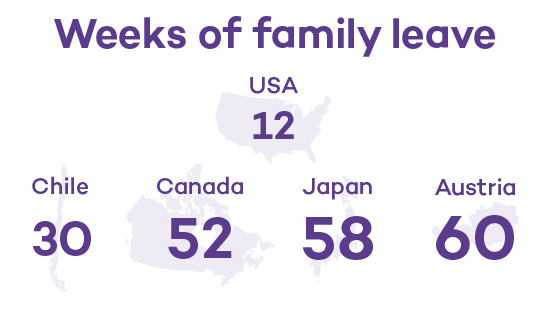Advocating for Paid Family Leave: Why It's Essential
Paid family leave has significant benefits for both employees and employers. It aids in promoting health equity and supporting family well-being. The United States, however, does not offer national paid family leave. It becomes the responsibility of businesses to care for their employees by providing paid family leave offerings.
Studies have indicated that paid family leave impacts positively on adult and child mental, physical, and financial health. Despite wide support for it, very few businesses offer it. This lack of support greatly affects low wage workers and part-time workers, who may not have access to these benefits.
In 2018, it was recorded that 56% of American workers had access to unpaid leave through the Family Medical Leave Act (FMLA), but only 86% of full-time workers and 51% of part-time workers had access to paid sick time. It’s also alarming to note that just 23% of private industry workers can access paid family leave.
Poor access to paid family leave impacts families heavily. Most new fathers only take one week of parental leave while mothers take an average of 10 weeks after childbirth, including paid and unpaid leave. Some women are reported to take no leave at all. Better access to paid leave would allow parents to take more time off without worries about finances or effect on their positions in the workplace.
California, Hawaii, New Jersey, New York, Rhode Island, and Puerto Rico have adopted temporary disability insurance as a part of unemployment benefits that could be used for family leave. However, there needs to be a broader adoption of these policies across the nation.
Despite many workers holding the notion that they would potentially disrupt productivity by taking extended paid leave, evidence points to the contrary. Research in California shows that paid leave has been linked to an increase in employment and has reduced turnover among staff. This strategy has, in turn, diminished recruitment, hiring, and training costs.
Inequality in access to paid family leave exacerbates racial and gender inequities. Women of color and those in low-wage roles are less likely to have access to paid leave and often cannot afford to take unpaid leave. This discrepancy creates a further widening of income disparities and other social gaps.
For workplaces, offering paid family leave has a positive impact on all. It aligns with company values, especially regarding work-life balance and wellness, and it sends a strong signal to employees about how much an organization values them. Thus, it’s more than just employers making policy changes; it requires providing comprehensive resources for employees, discouraging discrimination or retaliation for taking leave, and ensuring there are seamless processes in place for taking leave.
Until comprehensive federal and/or state paid leave laws are passed, businesses must take the initiative to offer paid family leave. This will not only help maintain a positive workplace culture but also cater to workers’ needs, thus promoting overall societal well-being.
